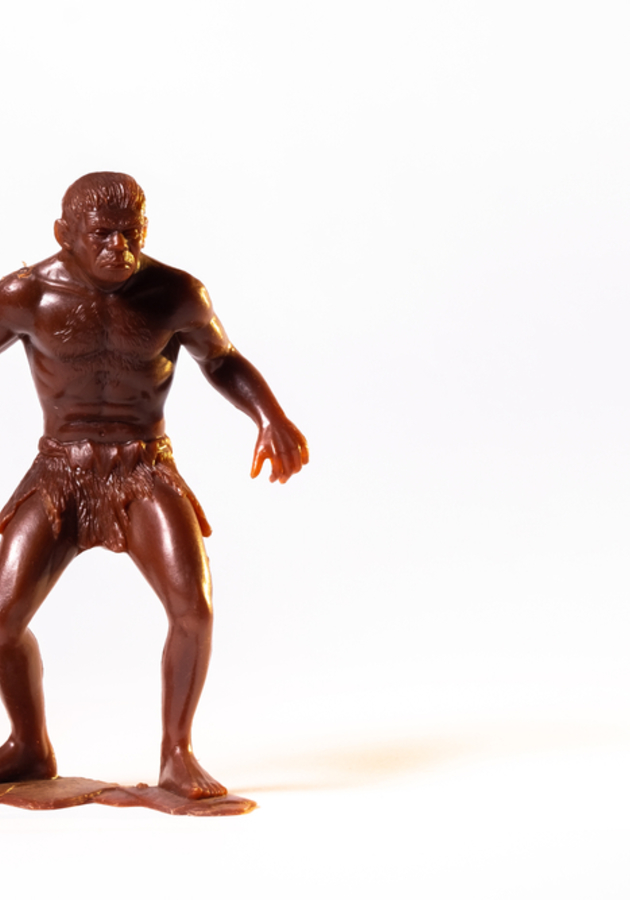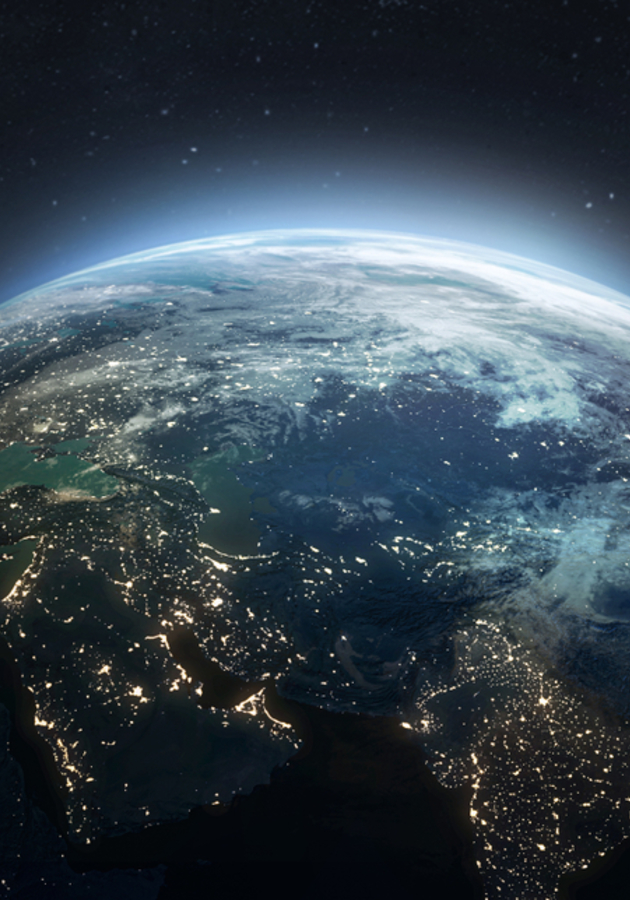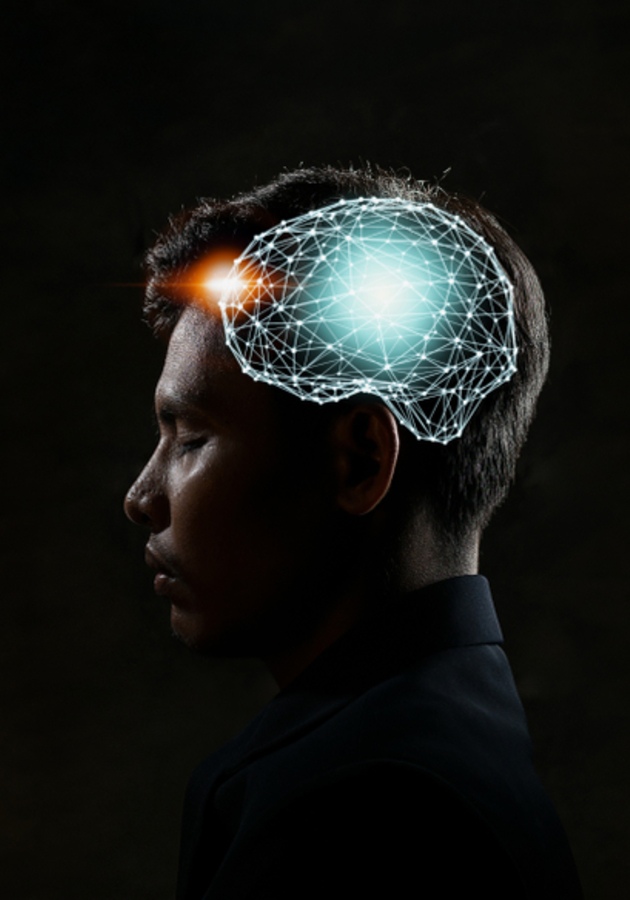Not many books in recent memory have enjoyed the public appreciation and critical fame that Yuval Noah Harari’s “Sapiens” has. Not only did the book become an instant publishing phenomenon soon after it was first translated into English in 2014, but – as The Guardian recently noted – its wild success can be linked to a broader ongoing book-buying trend, as it directly inspired “a surge in the popularity of intelligent, challenging nonfiction.”
In more ways than one, “Homo Deus” can be described as a sort of sequel to “Sapiens.” Harari tackles Big History here once again, exploring in detail the abilities that have helped humans become the most dominant species in the history of our planet. This time, however, he goes a step further, daring to paint a tentative image of the future that lies in store for humans once they learn how to overcome death and create artificial life. So, get ready for a provocative study of our history and a speculative account of our future!
The Four Horsemen of the Apocalypse
For thousands of years, humans were preoccupied with pretty much the same problems: starvation, epidemics, violence. So much so, in fact, that many of the brightest minds in human history repeatedly concluded that famines, plagues, wars, and death (not just coincidentally, the Four Horsemen of the Apocalypse according to Saint John) “must be an integral part of God’s cosmic plan or of our imperfect nature, and nothing short of the end of time would free us from them.” Though we still haven’t figured out a definite solution to these seemingly insurmountable problems, it is not an exaggeration to say that, at the dawn of the third millennium, they don’t seem as undefeatable and as overwhelming as they did for most of our past.
Let’s start with famine. Between 1692 and 1694, almost three million French people – or, 15% of the population – starved to death as a result of nationwide famine caused by bad weather and poor harvests. Today, even in the worst slums around Paris, people don’t die due to hunger. In another example from across the world, delegates at the first World Food Conference debated whether China would ever be able to feed its billion people just a few decades ago. Since then, in one of the greatest economic miracles in history, hundreds of millions of Chinese have been lifted out of poverty, and for several years the country has been free from famine – for the first time ever since it was founded. Globally, famine and malnutrition kill only about one million people every year; obesity, on the other hand, kills three million!
Moving on to plagues. As of February 2021, the ongoing COVID-19 pandemic has resulted in almost 2.5 million deaths out of 100 million confirmed cases. True, the numbers are discouraging, but they are nothing compared to those ascribed to the most famous outbreak in history, the so-called Black Death, which killed, in less than a decade in the middle of the 14th century, up to 200 million people in Eurasia and North Africa – more than a quarter of the population at the time! Today, although we are more vulnerable to diseases than ever (due to a combination of growing populations and better transport), both their incidence and impact have gone down dramatically.
Wars too are disappearing. As Harari explains: “Whereas in ancient agricultural societies human violence caused about 15% of all deaths, during the twentieth century, violence caused only 5% of all deaths, and in the early twenty-first century it is responsible for about 1%.” Just for comparison, in 2012, about 620,000 people died due to human violence, and almost 800,000 have committed suicide! Believe it or not, twice as many (that is to say, 1.5 million) died of diabetes. “Sugar is now more dangerous than gunpowder,” Harari memorably remarks.
The new human agenda
“For the first time in history,” writes Harari in a stunningly formulated observation, “more people die today from eating too much than from eating too little; more people die from old age than from infectious diseases; and more people commit suicide than are killed by soldiers, terrorists and criminals combined. In the early twenty-first century, the average human is far more likely to die from bingeing at McDonald’s than from drought, Ebola or an al-Qaeda attack.” Nevertheless, we still die. Dare we speak of Homo deus, when Death, the last and most fearsome horseman of the four, still reigns supreme? Gods, after all, are usually immortal. Humans still aren’t. Will they ever be?
Believe it or not, we’re getting closer to having an affirmative answer to that question. Death long stopped being “a metaphysical mystery,” but as we entered the 21st century, it seems to have become “a technical glitch.” Now that we know that humans die not because God decreed it or because the Grim Reaper is implacable – but rather because our bodies, just like any machine, wear out with time – we’ve stopped waiting for the Second Coming to overcome death and we’ve begun to look for technical solutions to the problem of death. And if we are to believe gerontologist Aubrey de Grey and polymath inventor Ray Kurzweil, we might find it already by the middle of our century. “If you ask me today is it possible to live to be 500,” said Bill Maris in a January 2015 interview, “the answer is yes.” And Maris is not just any person: he is the president of Google Ventures, and the founder of Google’s Calico project, whose stated mission is “to solve death.”
But what will happen then? – wonders Harari. Isn’t life meaningful solely because its pleasures are temporary? Don’t we risk losing meaning once we lose death? After all, people in the past didn’t commit as many suicides as people do today: as ironic as it might sound, they stayed alive because they had to fight to survive. They didn’t have time to think about whether they were happy or not. Nowadays, precisely because many of us are blessed with almost everything, we seem unable to explain what’s missing in our lives; so, we suffer. By all accounts, human progress hasn’t made humans happier, but more depressed than ever. Is happiness the next item on humanity’s agenda?
“Success breeds ambition, and our recent achievements are now pushing humankind to set itself even more daring goals,” writes Harari. “Having secured unprecedented levels of prosperity, health and harmony, and given our past record and our current values, humanity’s next targets are likely to be immortality, happiness and divinity. Having reduced mortality from starvation, disease and violence, we will now aim to overcome old age and even death itself. Having saved people from abject misery, we will now aim to make them positively happy. And having raised humanity above the beastly level of survival struggles, we will now aim to upgrade humans into gods, and turn Homo sapiens into Homo deus.”
Homo sapiens conquers the world
With regard to the gods that inhabit our stories, we may still be nothing more than wise humans (Homo sapiens), but in relation to other animals, we have been gods (Homo deus) for millennia. Indeed, even though officially we live in the Holocene epoch, it may be better to call the last few thousand years of Earth’s history the Anthropocene, that is to say, the epoch of humanity.
Ever since life appeared about four billion years ago and just until recently, never had a single species evolved so much to become such an important agent of change in the global ecology. Yet, nowadays, humans are not just another agent of change: they have been practically altering the global ecology all by themselves for thousands of years. It took an asteroid of unprecedented proportions to wipe out all the dinosaurs. If we decided today, we could kill all the gorillas and lions in the world by the end of the next month. Within 70 millennia – for that is how long we have existed – humans have managed to evolve from being just another type of primate to being the most successful species in history.
But how did we do it? How did we manage to domesticate nine-tenths of the large animals and create a world in which there are only 200,000 wild wolves and more than 400 million domesticated dogs? Were we superior by design, or are we just the local bully? Did we evolve over time to be more intelligent and more capable than our ancestors or are we just less merciful than them? The more we try to answer questions such as these, the less obvious the answers become.
To start with, the average person today is probably neither smarter nor more capable than the earliest humans. Hunter-gatherers didn’t enjoy the comfort of being apex predators that we do, so they had to be far more curious and creative to survive in a world ruled by other animals. We are, strictly biologically speaking, nothing more than another animal species, that is to say, we are substantially not much different from gorillas or even lions. Past civilizations and monotheistic religions tried to differentiate humans from the rest of the animal world by granting us “souls,” but there’s no evidence that souls exist. On the contrary, there is an abundance of scientific data suggesting that souls are just imaginary concepts that helped our predecessors structure the world in a more convenient manner.
But that might be the entire point: humans, explains Harari, rule the world not because they are superior species or because they have eternal souls or some unique kind of consciousness, but because they are capable of creating intersubjective realities, or “fictions” such as governments, money, religion and nations. As permanent as all of these might seem, they all exist – and look real – only because billions of people choose to believe in them. Unlike all other species, Homo sapiens can cooperate with countless numbers of strangers solely through the power of imaginative stories. This explains our mastery of planet Earth better than anything else.
Homo sapiens gives meaning to the world
It is neither tools nor inventions, but rather stories that serve as “the foundations and pillars of human societies.” It is thanks to stories of nations and governments, of gods and money that our reality cannot be properly described as either objective or subjective. Rather, we are living in an intersubjective world, one in which we constantly create meaning by weaving together common networks of stories. Objectively speaking, a dollar bill is a worthless piece of green paper, but you can buy food, beverages and clothing with it because billions of people believe in the story that the piece of paper has value.
The same holds true for holidays, democracy, nations or laws: all of them exist and have meaning because of our belief in their meaningfulness. Our belief, in turn, depends on the belief of our parents, friends, and neighbors and their belief depends on the belief of their parents, friends and neighbors. “People constantly reinforce each other’s beliefs in a self-perpetuating loop,” remarks Harari. “Each round of mutual confirmation tightens the web of meaning further, until you have little choice but to believe what everyone else believes.”
Throughout history, belief has been associated with religion. Because many Europeans believed in the veracity of the New Testament and the stories it told of everlasting souls and the soon-arriving kingdom of heaven, the Pope could launch the Third Crusade at the end of the 12th century, and send an army to recapture Jerusalem from Saladin and the Muslims. However, if some of the soldiers knew as much as modern scientists do, they would have probably felt the descent upon the Holy City was meaningless, and may have described the idea of dying by the sword in the name of Christ as most Christians would nowadays: false and misleading. Once something makes you wonder about the veracity of a narrative, its impact becomes less powerful and its web of meaning slowly begins to unravel.
Modern science did just that as far as most of our stories about gods are concerned. After all, whereas most gods throughout human history were vain enough to help only those who believed in them, you don’t need to believe in the power of an antibiotic to cure your infection with one. Unlike gods who exist only in our shared, intersubjective reality, antibiotics have an objective and measurable impact upon the existing world: they truly and actually kill bacteria and similar types of microbes.
Unfortunately, antibiotics are meaningless as well, possibly even in a more profound sense than gods are. Because, unlike gods, antibiotics do not help us with our ethical dilemmas. The same can be said about the entire discipline of science. True, it was science, and not religion, that has helped humanity defeat the Four Horsemen of the Apocalypse, but what we lost in this war was something far more fundamental: the meaning of the entire endeavor. And indeed, as Fyodor Dostoevsky wondered a few years after Darwin, isn’t everything permitted in a world devoid of God?
Homo sapiens loses control
As far as Harari is concerned, neither religion nor science are interested in truth. Religion, he claims, is interested primarily in order, in creating and maintaining social structures; science, on the other hand, is interested in power, aiming to cure diseases, fight wars and produce food. The deal of modernity, writes Harari, is “a surprisingly simple deal” that can be summarized in a single phrase: “humans have agreed to give up meaning in exchange for power.”
Put simply, sometime around the Renaissance, humans decided to renounce their belief in a great cosmic plan – a plan that gives meaning to life – and received immense amounts of power in return; we are now able to control everything, even the fate of our entire planet. To fill the void left by the absent God, soon after banishing him to the margins of history, humans decided to put themselves in the center of the universe. “Man is the measure of all things,” said Protagoras in the fifth century before Christ. It took humanity two millennia to accept this as an adequate philosophy of life. Harari calls this philosophy: humanism.
“According to humanism,” he explains, “humans must draw from within their inner experiences not only the meaning of their own lives, but also the meaning of the entire universe. This is the primary commandment humanism has given us: create meaning for a meaningless world.” Just like theists worship gods, humanists worship humans. Most of them also worship individual rights and liberty and, due to this emphasis, the most common branch of humanism today is usually called “liberalism.” As liberal humanists, most of us believe that “Homo sapiens has some unique and sacred essence that is the source of all meaning and authority in the universe. Everything that happens in the cosmos is judged to be good or bad according to its impact on Homo sapiens.”
What science gives, science takes away. The more we studied ourselves, the more we realized that we are faulty by design, and that rather than being in control, we are in fact controlled by our needs and desires, by our subconscious instincts and fears. More importantly, we also realized that many of our biological limitations can be surpassed through technology. So, we started doing just that, automating many processes and devising incredible things such as computers and smartphones, AI-powered virtual assistants and self-driving vehicles. In fact, we are already on a path of replacing ourselves with the next generation of species: automatons.
And why shouldn’t we? It takes decades to train a single doctor, and no matter how good he might turn out to be, he would still be able to effectively work only 10 hours a day. A robot-doctor, on the other hand, will be able to work 24/7 and will never file a complaint. Moreover, once we find a way to create one, we will be able to create an infinite number of equally qualified robot-doctors for very little money and in a very short period of time. But what will happen then with all the human doctors? What will happen with all the drivers, shelf-fillers, salespeople and receptionists once we learn how to create better versions of them with AI? So far, we’ve managed to make God superfluous; soon enough, we might make ourselves superfluous as well. Will we know what to do then?
Final notes
Even though Time magazine listed “Homo Deus” as one of its top 10 nonfiction books of 2017, the general feeling among critics was that the book didn’t live up to the high expectations set by its predecessor, “Sapiens.” Be that as it may, if you enjoyed “Sapiens,” there’s no way you are not going to enjoy this one too. True, parts of the book regurgitate some of the ideas that made Harari famous in the first place, and true, he tends to generalize and oversimplify about the future even more than he does about the past.
But, so be it! His instantly recognizable style and unique brand of cynicism make “Homo Deus” a welcome addition to a growing and important body of speculative literature interested in what could come after superintelligence and whether we should eagerly await, or be afraid of such a future. Unlike most books on the subject, Harari doesn’t just pose the questions, but gives answers as well. And even when they sound far-fetched, they seem too intriguing and stimulating to not make you think. A lot.
12min tip
Rather than with our customary tip, we’ll end this microbook with one of Harari’s most thought-provoking questions: “What will happen to society, politics and daily life when nonconscious but highly intelligent algorithms know us better than we know ourselves?”





























